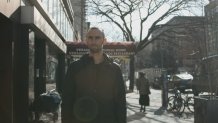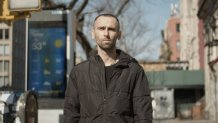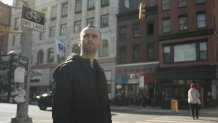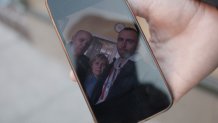Russia’s invasion of Ukraine, which began last month, has forced millions of people in the country to flee the danger and seek refuge elsewhere in what the U.N. describes as “the largest humanitarian crisis Europe has seen since World War II.”
Being displaced from your home, country and community because of an unprovoked war is an incredibly difficult and traumatic experience for the survivors. And for Ukrainians looking for refuge in the United States, it’s not simple process.

NBCLX storytellers Ngozi Ekeledo and Mackenzie Behm spoke with Misha Pishak, a 36-year-old refugee from Kyiv who was born in Western Ukraine and recently arrived in New York City after a harrowing journey. He left Ukraine on Feb. 24 and didn't arrive in the U.S. until March 4.
It's difficult for Ukrainians fleeing the war to seek refuge in America, but Misha was able to do so because he obtained an American visa two years ago through work. It will expire in six months. In Ukraine, Misha worked as a real estate agent with his own company. In America, he's working a few hours a week at a restaurant.
The following account has been translated from Ukrainian to English and edited for clarity.
His decision to leave Ukraine
When you hear an explosion a few blocks away, you are not deciding anything. The self-preservation instinct kicks in.
When I left Kyiv, I didn’t have a goal of leaving Ukraine for America. My first goal was to get [my] parents to safety. Then I was deciding what to do, and only after that I planned on coming here.
The first four days when it all began, even the first five days, the day began with social media — Instagram, Facebook — and when I was seeing the news, one could not not cry. My every morning started with tears. Then when I started the trip, I was reading the news less, so it calmed me down. But now it is also very hard to be living through this.
From the beginning, leaving was very hard, because there were traffic jams. Everything was happening very fast, and people reacted fast. We were informed that there could be attacks from the Russian side, but nobody believed [it] because it was hard to believe it: 21st century, center of Europe, and for this to happen? But it happened at 4 a.m. in the morning. At 6 a.m. there already were air raid sirens and you could hear the explosions.
His journey to the United States
Without a second thought, [my parents and I] packed things and left. I picked up my friend and his family — a wife and a small child — on the way, and we drove towards Western Ukraine. Usually the trip takes eight to nine hours, it depends, but we were driving for 22 hours because there were long traffic jams. Just to leave Kyiv it took us four hours, which usually takes just 20 minutes.
When we got to Western Ukraine, we stayed at my grandmother’s house. Then I started thinking how to get abroad so that I could sustain the family and help them somehow because my parents are staying in Ukraine.
Commercial airlines were not flying from Ukraine at that time when the war started. You could only fly from neighboring countries. I crossed the Romanian border [on foot]. From Romania, I flew to Italy, from Italy to the Netherlands, and from the Netherlands to the U.S.

Since there is martial law in Ukraine right now, men from 18 to 60 years of age are not allowed to leave. I could leave because I have a military service card that says that I am not subjected to draft because of a health condition. My friends can’t.
His experience in New York City
When I came to New York last time, I was amazed. I really liked the city. Now, when I came, for three days I didn’t even look up to see what’s up there. I didn’t see the city. I was focused on my issues, on my stress, on my problems that need to be solved.
It is, of course, very hard. This is how I crossed the border: I didn’t have clothes, anything. Everything I achieved in life stayed in Ukraine, and now I have to start from scratch.

Apart from that, it’s hard. I have a beginner’s level of English, and without English, it is hard. I understand that and am looking where I can settle.
It is still in the process. I am looking for housing and a job right now, for everything to get settled. Some acquaintances asked their acquaintances to help me out. I am staying with them for a week now. Originally, they asked for two days, but it’s already been a week.
I have not met anyone who is in a similar situation as I am. There are many people who came here before, Ukrainians, offering to help. But I have not seen anyone who came at the same time that I came.

I am also worried about friends, acquaintances, parents.
Also, my mother experienced a severe stress. She is getting medical help that is helping her cope with this stress. She is having sleeping issues, can’t fall asleep.
[My parents] are fine in Ukraine. Well, they are currently in danger in Ukraine, but they won’t leave. They have an opportunity to go to Italy, Germany, but they do not want to leave.
I’ll see how I settle down here, and in the future, yes, I think I will return to Ukraine. But I understand that in the nearest future, the infrastructure is destroyed, and it will take a long time to rebuild.

